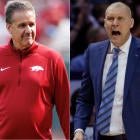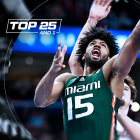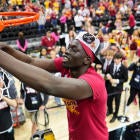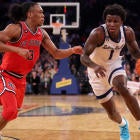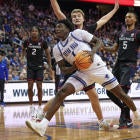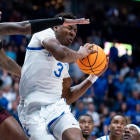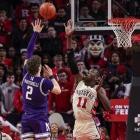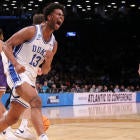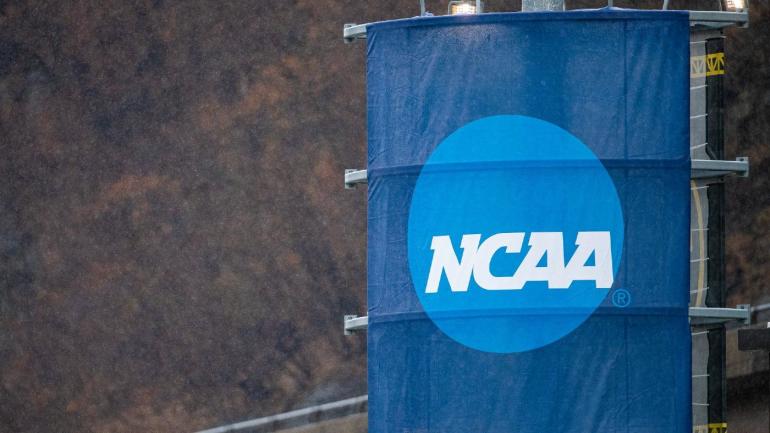
The Supreme Court's decision against the NCAA in its high-profile case tied to restricting educationally linked benefits for college athletes -- a devastating 9-0 return released Monday -- will almost certainly be remembered as the first substantial blow that changes college athletics forever.
Even though the case, specifically, had little to do with paying players or allowing them to profit off their names, images and likenesses, NCAA v. Alston's ultimate impact should transcend its contents debated therein. This case will not go down as an afterthought or minor victory tied to allowing players being able to be gifted with a laptop or a $4,000 paid internship, which is now permissible, effective immediately.
This is the Supreme Court of the United States; its decisions have serious consequences, and the people at the NCAA's headquarters know the organization is about to face them.
Monday's ruling represents a foreshadowing of something ominous for the gatekeepers within the NCAA -- the people who have restricted the rights of college athletes for generations. The final sentence of the document -- in the concurrence portion, from Justice Brett Kavanaugh -- is sure to be remembered as the most quoted line from the ruling: "The NCAA is not above the law."
It could nonetheless be argued the NCAA's acted that way for decades.
In effect, what happened Monday was the Supreme Court upholding a lower court's ruling from 2018 (remember, this got to the Supreme Court because the NCAA insisted on one more fight). All nine justices on the most esteemed bench in the United States affirmed that the NCAA has, for essentially its entire existence, been in violation of antitrust laws due to its stance on restricting the educational-related benefits of college athletes by limiting said benefits in the name of "amateurism."
What is an educational-related benefit? That question just got more loaded; the definition will be open for interpretation. College athletics became more interesting, and competitive, and equitable, Monday.
The decision itself is not surprising. After the appeal for this case was heard in March, the questions and tones of the justices toward NCAA legal counsel indicated an anti-NCAA approach. The belief among the legal experts CBS Sports spoke with was that a 6-3 or perhaps even 7-2 decision in favor of Alston was most likely.
Instead, the NCAA got swept.
SCOTUS rules 9-0 against the NCAA. Why Monday was a huge day, and what it means for the future. Listen below.
The NCAA has been restricting how much athletes can be given, in terms of benefits, tied to the collegiate experience. The Supreme Court ruled that is illegal and in violation of the Sherman Antitrust Act, which dates back to 1890 -- two full decades before the NCAA adopted its name -- and under law bars collusion and conspiracy to restrict commerce, trade and more. In short: it allows for a free market, no matter the market, so long as the market is deemed legal.
And though this case-and-decision are not directly tied to name, image and likeness rights, the two are inextricably linked. The Court's ruling opens a cavernous path for antitrust lawsuits and suggests many dark days ahead for the NCAA and its coffers. Effective immediately, the Court has stripped the NCAA of some of its restrictive power. College athletes will no longer have a cap on expenses tied to their education. There can be an unlimited number of education-adjacent benefits extended to them, the same way everyday students are afforded things like -- gasp! -- paid internships.
The irony of all of this is that the NCAA, which spends tens of millions of dollars annually in legal arenas, took this to the Supreme Court of its own volition. The NCAA did this, presumably, out of some combination of outmoded nostalgia and self-imposed myopia over the nature of how the real world works, how it's changed since the 1950s, and why restricting the earning rights of a labor force is a fight that, in 2021, can't and won't be won. Congratulations: you played yourself, etc.
Then the organization got dressed down by Justice Brett Kavanaugh, of all people, someone regarded as a staunch conservative.
"The NCAA's business model would be flatly illegal in almost any other industry in America," Kavanaugh wrote in his concurrence, which is a separate piece of opinion from the Court's primary/unanimous ruling, which was written by Justice Neil Gorsuch. "Bottom line is the NCAA and its member colleges are suppressing pay of student athletes who collectively generate billions of dollars in revenues for colleges every year. Those enormous sums of money flow to seemingly everyone except the student athletes."
Kavanaugh even went so far as to bring up potential collective bargaining and unionization for college athletes -- an avenue that, if successful, would lead to straight pay-for-play. Kavanaugh not-so-subtly alluded to the practical flaws (if not potential illegality) with the NCAA's system as it's currently constructed.
"College presidents, athletic directors, coaches, conference commissioners, and NCAA executives take in six- and seven-figure salaries. Colleges build lavish new facilities," Kavanaugh wrote. "But the student athletes who generate the revenues, many of whom are African American and from lower-income backgrounds, end up with little or nothing. ... Everyone agrees that the NCAA can require student athletes to be enrolled students in good standing. But the NCAA's business model of using unpaid student athletes to generate billions of dollars in revenue for the colleges raises serious questions under the antitrust laws. In particular, it is highly questionable whether the NCAA and its member colleges can justify not paying student athletes a fair share of the revenues on the circular theory that the defining characteristic of college sports is that the colleges do not pay student athletes. And if that asserted justification is unavailing, it is not clear how the NCAA can legally defend its remaining compensation rules."
A lawyer representing the NCAA dismissed Kavanaugh's concurrence to USA Today with a wave of his hand, and in doing so, unintentionally exposed the very arrogance that led the NCAA to this crossroads of embarrassment and depravity to begin with.
But it's significant. What Kavanaugh wrote could well portend the future the NCAA is headed toward. Monday's ruling was a rebuke on a small but important bedrock of NCAA philosophy that is now, immediately, illegal. Kavanaugh's concurrence is practically an invitation for future lawsuits to eventually tear down the framework of the NCAA.
College players don't have a right to be paid? Under what law and statute? It sure seems like a litany of smaller fights are now scraping the horizon, all of them amounting to one huge battle for players' rights that will ultimately decide the new reality of what the NCAA is defined by and what it's restricted to enforce.
Monday's decision lands a day before the Division I Council is going to meet to discuss further NIL legislation -- something that's been promised for more than a year, was punted in January because of the SCOTUS case, and now can't be delayed any longer. As a governing body, the NCAA is now near-naked, exposed and vulnerable to countless antitrust lawsuits. This is where the real damage could come.
From my colleague Dennis Dodd's column: "When Sen. Maria Cantwell (D-WA), chair of the Senate Committee on Commerce, announced last week that Congress wouldn't have an overarching federal NIL bill in place by July 1, the NCAA was sent into scramble mode. The NCAA needs federal help or else it risks the perception that it is capping compensation by implementing a NIL rule, thus violating those antitrust laws."
Massive implications await. That's why Monday's ruling was so big. The Supreme Court was definitive in its opposition to the NCAA's rules. There's no indication that the NCAA will have any more success if it ever tries to take an amateurism case to those nine justices again. We now have nearly every indication that this resistance from Indianapolis can no longer hold.
In other news, this all comes less than two months after NCAA president Mark Emmert was given a contract extension through 2025. Reports are he'll make nearly $3 million annually.














